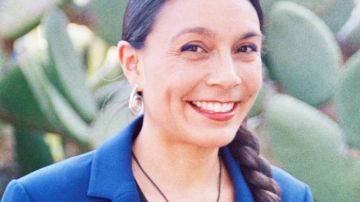Veronica Terriquez is First Female Director of UCLA’s Chicano Studies Research Center
Latinxs in position of power in higher education remains low but there is some progress being made

Photo: Ernesto Chavez
Latinxs in position of power in higher education remains low but there is some progress being made. For 51 years UCLA’s Chicano Studies Research Center has had male directors but now that’s all changed with the appointment of a woman at the helm. Veronica Terriquez will become the 10th director in the center’s 51-year history and the first woman to take on the role. She’ll also work as a professor in UCLA’s Luskin School of Public Affairs and in the UCLA College. The center was the base for one of the two significant national Chicano Studies journals–Aztlán–that helped establish the field, according to their website.
“I’m thrilled to be able to direct a center whose mission is to leverage original research on U.S. Latinx communities in order to have an impact on the campus, higher education and the broader society,” Terriquez told UCLA Newsroom. “I’m honored to assume the role of director, following Chon Noriega whose visionary leadership has broadened the scope of the center’s scholarly and public impact, particularly in the arts.”
Starting July 1, I will be the first woman director of the UCLA Chicano Studies Research Center in its 51-year history. I am looking forward to advancing the public mission of a center that came about as a result of student and civil rights activism. https://t.co/HArC5xDyY3
— Veronica Terriquez (@V_Terriquez) June 8, 2021
Before taking on the role at UCLA she was an associate professor of sociology at UC Santa Cruz in Northern California. She received her doctorate in sociology from UCLA, a master’s in education from UC Berkeley, and her bachelor’s in sociology from Harvard University. Her research focuses on efforts to civically engage youth, immigrants and other low-income residents of color, according to UCLA Newsroom.
“Looking ahead, I see dynamic points at which the CSRC’s historic achievements could be used to spearhead new collaborative efforts that respond to contemporary political, economic, environmental and social crises impacting Latinx communities,” she said. “As someone who has tracked youth and multi-generational activism across the state over the past decade, I believe that the center can be a critical thought partner alongside educators and grassroots leaders in helping define the future of California and the country.”
Youth activism is at the core of the development of Chicano Studies at UCLA. Students and faculty undertook civil disobedience, and a non-violent hunger strike in the Spring of 1993 demanding greater support of the program and the establishment of a department of Chicana and Chicano Studies. This led to the development of a new academic unit–a center for interdisciplinary instruction (CII)–and six new full-time faculty positions within this unit.
It’s a sign of progress for a woman to be in such a position and even more exciting to see her push for supporting youth activism. Diversity within the faculty and staff in higher education remains an issue. While 19 percent of all students enrolled at universities in the United States are Latinx, only 4 percent of college or university presidents were Latinx as of 2016, according to data from the American Council on Education. Meanwhile, of all full-time faculty in colleges/universities fall 2018, around 40 percent were white males; 35 percent were white females; and only 3 percent each were Latina and 3 percent Latinos. The appointment of Terriquez is a stark reminder that there is still a lot of progress to be made but it’s moving in the right direction.
“I am looking forward to advancing the public mission of a center that came about as a result of student and civil rights activism,” Terriquez tweeted in her announcement.

















